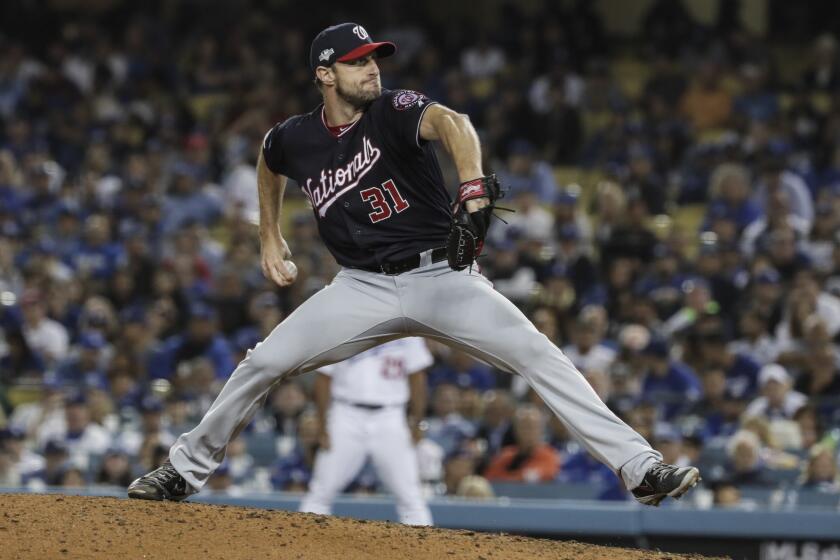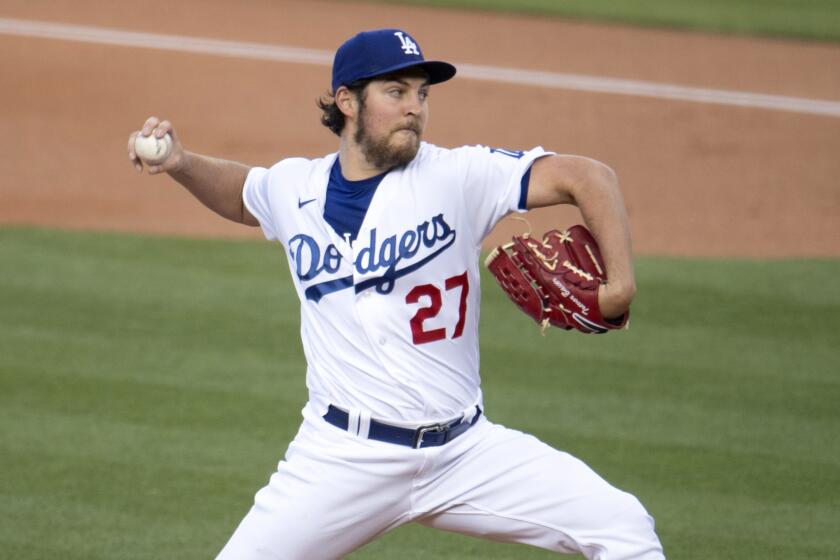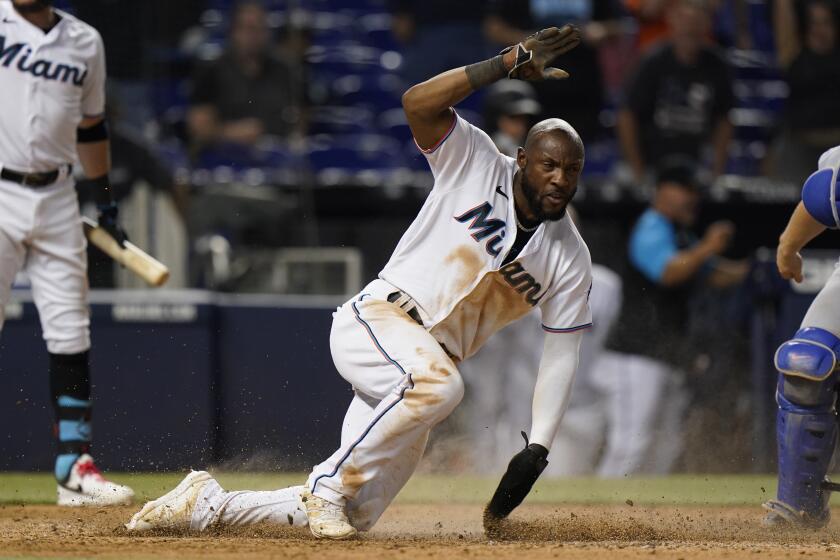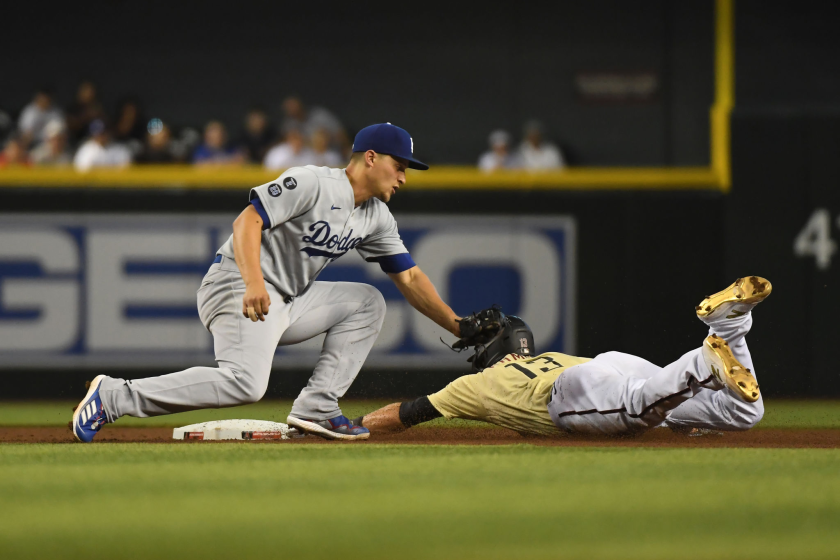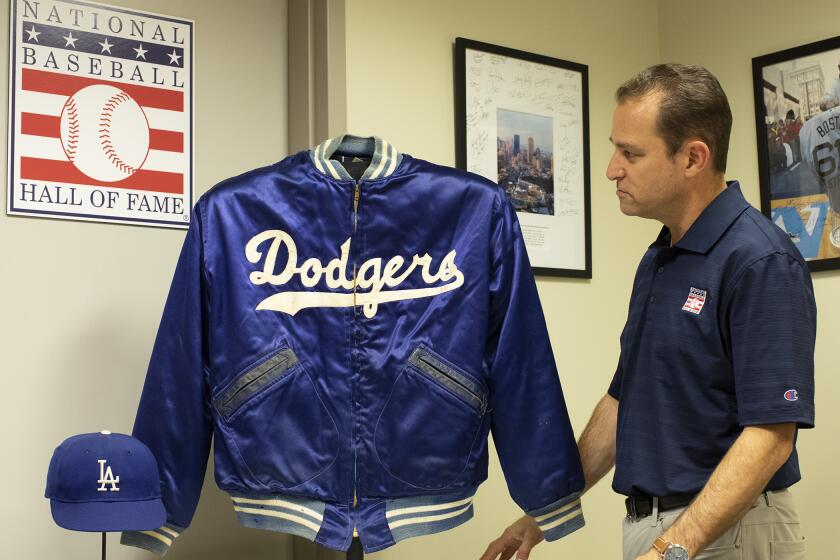News Analysis: Dodgers’ trade for Max Scherzer and Trea Turner was bold — and essential
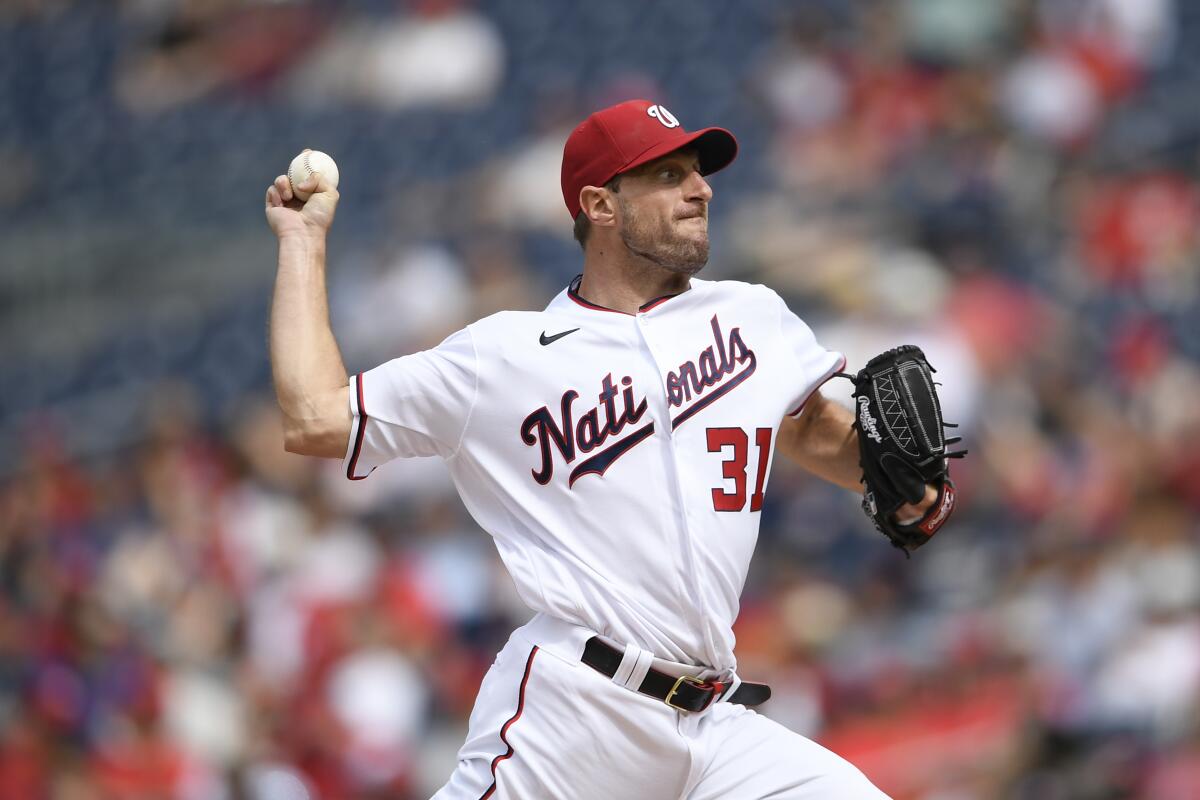
- Share via
On May 9, after his Dodgers’ record dropped to 18-17 with a loss to the Angels, manager Dave Roberts dispelled any concern. He projected confidence.
“We’re gonna be at the top of this division,” Roberts said. “I have no doubt in my mind.”
The Dodgers had lost 15 of 20 games. They were reeling. But 127 games remained on the regular schedule, plenty of time to surpass the San Francisco Giants and San Diego Padres in the National League West and steer themselves on track to another World Series title.
On cue, the Dodgers rebounded. They entered Friday 44-25 since that loss in Anaheim with the fourth-best record in the majors. The turnaround was expected. Less expected: The Dodgers are still sitting in second place behind the Giants with a stubborn uncertainty looming over some of their best players.
Trevor Bauer is out indefinitely — maybe never to wear a Dodgers uniform again — after being accused of sexual assault. Mookie Betts has a nagging hip injury. Clayton Kershaw is on the injured list with forearm trouble. Cody Bellinger is batting .160. Corey Seager returned Friday after missing 2½ months with a broken hand.
Just when it looked like a division rival would make the biggest splash at the trade deadline, Andrew Friedman of the Dodgers came through again.
Winning their ninth straight division title, never mind a World Series, to avoid the dreaded one-game wild-card playoff would require favorable outcomes for matters beyond their control.
So Andrew Friedman took control before Friday’s trade deadline. On Thursday, the president of baseball operations traded for Danny Duffy to fortify the pitching depth. On Friday, he upended the baseball world by acquiring All-Stars Max Scherzer and Trea Turner from the Washington Nationals for four minor leaguers, including Keibert Ruiz and Josiah Gray, the organization’s top two prospects.
Turner is a versatile talent with another season under team control; he provides a safety net for a lineup in constant flux. He’s also the logical replacement for Seager at shortstop in 2022 if Seager departs in free agency this offseason. Scherzer will effectively replace Bauer for the remainder of the season. Though he is a free agent this winter, the Dodgers hope to re-sign him. In the short term, they kept him from going to the rival Padres, who made their own hard push to land Scherzer.
Upon signing Trevor Bauer, the Dodgers cited a thorough vetting process; now Bauer’s career as a Dodger is in limbo. How a $102-million risk went wrong.
“For us it was about adding impact talent,” Friedman said of beating out a division rival for Scherzer. “It’s definitely an added bonus, but not the driver.”
Major midseason trades aren’t foreign to Friedman. He acquired Rich Hill in 2016, Yu Darvish in 2017 and Manny Machado in 2018. But Friedman knows this year is different. The Dodgers aren’t the only NL West power anymore — not this season and not for the foreseeable future.
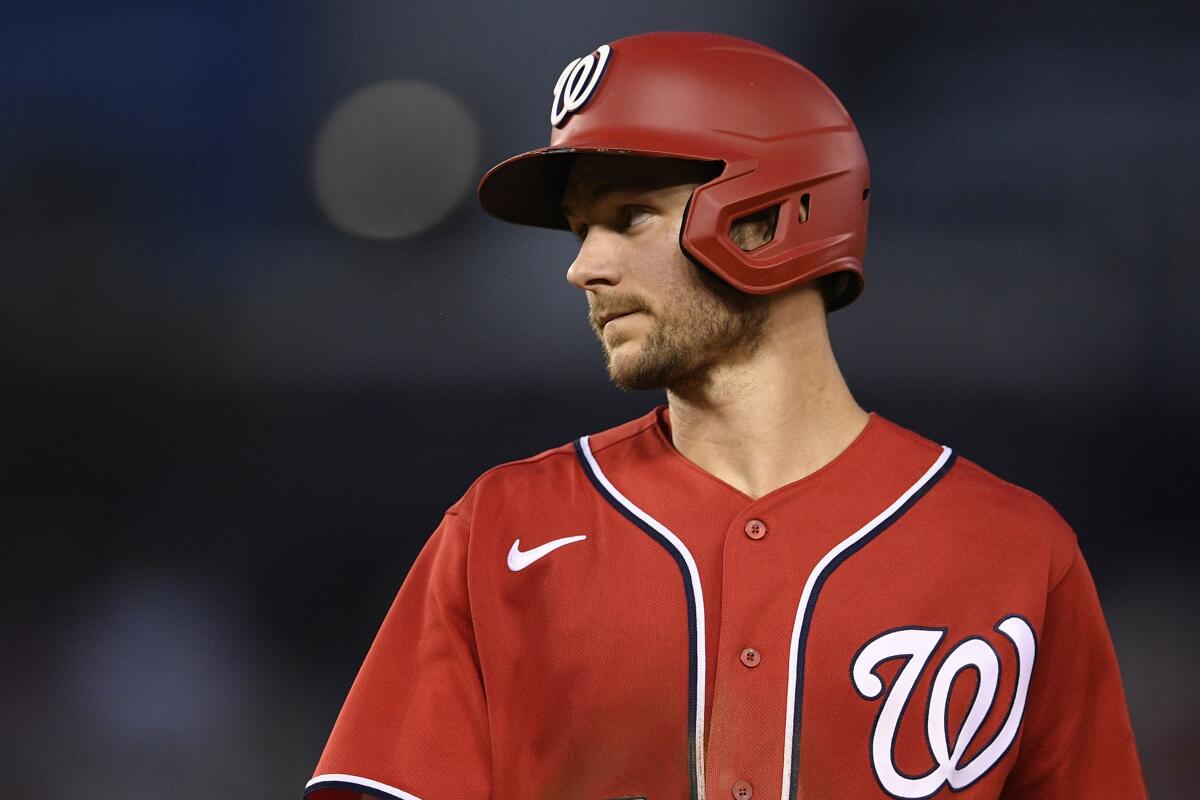
Even when the Colorado Rockies pushed the Dodgers for the division crown in 2018 — taking them to a Game 163 — the Dodgers always felt in control not only of their present, but of their future as well. They were built to own today and tomorrow. Friedman was threading the needle between short-term contention and long-term sustainability without a formidable challenge.
Now he has not one, but two, formidable challenges.
The Dodgers aren’t the only NL West power anymore — not this season and not for the foreseeable future.
The Padres — fueled by Fernando Tatis Jr.’s emergence and Machado’s signing — morphed into contenders last year and have aggressively bolstered the roster to surpass the Dodgers.
The surprise, though, is the Giants’ emergence. San Francisco wasn’t projected to contend under Farhan Zaidi until after their veteran-heavy books cleared this winter and their top prospects rose to the big leagues in another year or two. Instead, they boast the best record in the majors, prompting them to buy at the deadline and acquire former MVP Kris Bryant from the Chicago Cubs.
The consensus is Zaidi will build an enduring contender modeled in the image of the Dodgers powerhouse he helped build as Friedman’s right-hand man from 2014-18. The Padres operate a little differently under the more freewheeling A.J. Preller, but they’ve assembled one of the league’s deepest rosters while maintaining a robust farm system.
With the trade deadline on Friday, The Times provides real-time updates and analysis on all the transactions in Major League Baseball.
Friedman threaded this needle for the last six seasons without external pressure. Friedman and Co. didn’t expect to have to pull off a trade of this magnitude. The Dodgers began the season with the deepest roster in the majors. The rotation and lineup were loaded. Maybe minor moves to plug holes, but nothing significant. That changed over the next four months.
“Right now we have to think long and hard about August and September,” Friedman said. “So that definitely played a role in this, for sure.”
The genesis for Friday’s seismic trade can be traced to the Dodgers’ four-game series in Washington at the beginning of July.
The Dodgers arrived in the nation’s capital on a Wednesday, the day after a woman accused Bauer of sexual assault and obtained a temporary restraining order against him. On Thursday, they visited the White House to celebrate their 2020 World Series. On Friday, Bauer was placed on paid administrative leave.
Corey Seager, who returned from the injured list, was evasive about how the trade for shortstop Trea Turner would impact his future with the Dodgers.
On Saturday, before the Dodgers beat the Nationals for the third straight night, Scherzer mingled with a few Dodgers during batting practice. The three-time Cy Young Award winner and Walker Buehler, teammates in the All-Star game in nine days, spoke at length. Blake Treinen, Scherzer’s teammate in Washington, walked over for a chat.
Scherzer held the Dodgers to one run over six innings the night before, but the Nationals were falling apart around him. Kyle Schwarber limped off the field with a hamstring injury. Turner hurt his finger days earlier. Stephen Strasburg remained out with a neck issue.
The genesis for Friday’s seismic trade can be traced to the Dodgers’ four-game series in Washington in July.
The Nationals had been surging, emanating 2019 championship vibes. But the Dodgers swept them and they never recovered, leading to general manager Mike Rizzo’s decision to deal eight veterans, including three All-Stars, less than two years after winning a World Series.
The abrupt shift exhibited the cyclical nature of Major League Baseball. Front offices strive to avoid rebuilds, to remain in World Series contention every year. But it’s a seemingly impossible task. The winning always stops. It’s only a matter of time.
Friedman and the Dodgers aren’t there yet. They’re still vying for championships with the most expensive roster in the majors. But sustaining the success is only getting more difficult. The competition is catching up and they know it.
More to Read
Are you a true-blue fan?
Get our Dodgers Dugout newsletter for insights, news and much more.
You may occasionally receive promotional content from the Los Angeles Times.

